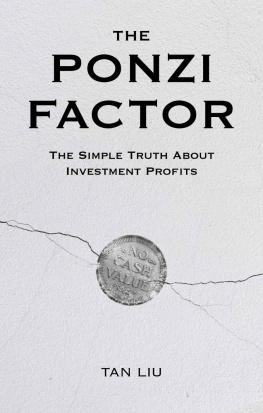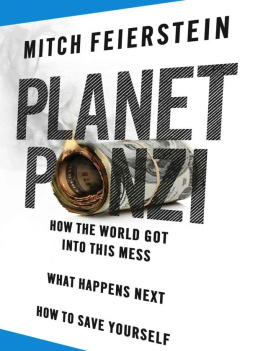
Ponzi
The
Incredible True Story
of the King
of Financial Cons
Donald H. Dunn
LIBRARY OF LARCENY
BROADWAY BOOKS
NEW YORK
Contents
For Barbara Sue Kramer in 1975
And for my wife, Kerstin Trone, these joy-blessed last 25 years
Acknowledgments
Incredible and fanciful as they may seem, the events recorded in this book are as factually true as nearly two years of research and reporting can make them. Although treated novelistically, what happens is grounded thoroughly in reality, and I would like to credit the institutions, individuals, and various texts that furnished details and assistance.
Of great significance was a rare copy of Charles Ponzi's privately published autobiography, The Rise of Mr. Ponzi, and special thanks goes to Marc Cheshire for his aid in making the work available to me from the Library of Congress.
The library of the Columbia University School of Journalism, with its prizewinning entry of the Boston Post in the 1921 Pulitzer Awards, was extremely helpful.
In addition to the Post files and those of other Boston papers of the day, considerable information was gleaned from the New York Times files at the New York Public Library; the New Yorker, May 8, 1937; The Ponzi Bubble by Albert Hurwitz, in the Herald magazine of the Boston Sunday Herald Traveler, August 30, 1970; New and Old South Sea Bubbles by A. B. Reeve, in World's Work, November 1920; For Exposing Ponzi... and other articles in Literary Digest; The Scandalous Scamps by Harold Mehling, published by Henry Holt & Co.; Great Swindlers by A. F. L. Deeson, published by Drake Publishers; Strange Tales of Amazing Frauds, published by Garden City Publishing Co.; Ponzi's Dupes, New Republic, September 8, 1920; Life, January 31, 1949; Bubble BubbleNo Toil, No Trouble by Francis Russell, in American Heritage, February 1973; and Only Yesterday by Frederick Lewis Allen, published by Harper & Brothers.
A special bow of appreciation to Mrs. Barbara Kelly at the Office of the Clerk, U.S. District Court, Boston, Massachusetts, for locating and providing numerous court documentstranscripts of Ponzi's bankruptcy hearings, copies of indictments, and other material.
On a personal note, I want to thank Mrs. Joseph Ebner of Palm Island, FL; Mrs. Lucy Meli Christoforo; Albert Hurwitz; Paul D'Espinoza; Ann Ray Martin of Newsweek; Richard Burgheim of Time, Inc.; Martha Palubniak of Wordservice International; Henry Johnston; Bob Grunin; editor Joyce Johnson; the late Lewis H. Young; Robin Carlson, Tessie Mantzoros, Jerry Raboy; and Sally Powell, all at Business Week; my agent, the late Elizabeth McKee; Anne Colamosca; William Wolman; Sanford Teller, and James Abernathy of Abernathy-MacGregor.
Don Dunn
July 2003
Preface
In a packed hearing room in the nation's capital, a U.S. senator pointed an accusing finger at Kenneth Lay, the former chairman of Enron. The company's bankruptcy, the largest in American history, he thundered, had caused Enron investors and employees to lose billions of dollars. And you, sir, are the most accomplished confidence man since Charles Ponzi!
Ponzi. More than eight decades since the name first drew widespread attention, it instantly invokes the basic elements of a mammoth swindle: an ever-growing crowd of gullible citizens pouring hard-earned investment money into the hands of a smooth-talking individual with a promise of profitsthen seeing their money and the individual disappear.
But over the years and decades and centuries, swindlers and con men come and go. Why Ponzi as the archetype? Why does Ponzi scheme appear almost daily in headlines as officials of the law uncover yet another scam and its long list of victims? Indeed, whywhen a bank robbery isn't a Dillinger caper, a kidnapping isn't a Hauptman affair, or a mobster's murder isn't a Capone jobwhy is Ponzi's the only criminal's name that denotes a particular kind of crime?
Such questions came to mind almost as soon as I first became aware of Charles Ponzi. That occurred nearly thirty years ago when I was called to the office of the editor-in-chief of Business Week magazine, where I worked. In his hand was the draft of an article I'd written for the upcoming issue. It was about a company that had swiftly grown from quite modest beginnings into a powerhouse.
So fast? he questioned. Are you sure this isn't a Ponzi scheme?
I met his gaze. Their figures check out, I said with some firmness. He hesitated, then waved me out the door. In the corridor, I stopped the first editor I met. What the heck is a Ponzi scheme? I asked.
The reply was vague: Some kind of swindle back in the twenties or thirties, I think. I was puzzled. This was the mid-1970s. Why did the editor bring up something that had happened some fifty years earlier? I put it out of my mind, until over the ensuing weeks the name Ponzi seemed to jump from the pages of newspapers and magazines with astounding regularity. Here, a man had run a Ponzi scheme that lured thousands of investors into a plan to unload surplus industrial wine as salable vinegar; there, and there, and there, hordes had lost money when they invested in projects supposedly based on oil leases, real estate, gold bullion, and other commodities. Instead, they eventually learned they had been contributing to just one more Ponzi pyramidso-called because the money needed to pay profits to one investor must come from the next two investors, and the money to pay those two must come from the next four, and so on.
Intrigued by what this Charles Ponzi must have done to make his name legendary, I headed for the library. I found no books about the man, only an occasional magazine article and a paragraph or chapter in collections on celebrated criminals. I pored over volumes of yellowed newspapers and microfilm files. The essential story was this: In the first six months of 1920, the pint-sized Italian immigrant had taken millions of dollars from thousands of people in New England before being declared bankrupt. But the details? I sorted through the many contradictions and exaggerations in the articles and reports, written loosely in the journalistic style of the day. Had Ponzi come to America as the educated scion of a wealthy Italian family, or was he a rogue who'd been forced to leave Italy with the police hot on his heels? At the height of his scheme, did investors really flood into his small office in such numbers that their money got stuffed into wastebaskets and desk drawers?
The more I read, the more I was amazed at the sheer ability and audacity of the man. Diminutive and dapper, he had evidently picked up the English language on the fly. Yet he had a vocabulary and manner that enabled him to captivate both the common folk of Boston's immigrant neighborhoods and its well-schooled Back Bay socialites. His scheme was simple enough on the surface to appeal to the unsophisticated, and yet intricate enough to intrigue those with financial expertise. And he operated so openly and efficiently that in a scant six months, he soared from anonymity to the status of a millionaire deserving of public acclaim. All this, too, in an era before such things as TV exposure or spam-saturated Internet existed to spread the word. Like Arthur Miller's salesman Willy Loman, who went to work each day with a smile and a shoeshine, Charles Ponzi had the smile and the shine, but he had something morea promise of riches. Over 180 days his promise sped via word-of-mouth, with each investor telling others about a sure bet to turn $10 into $15, $100 into $150, or $10,000 into $15,000!
Next page




